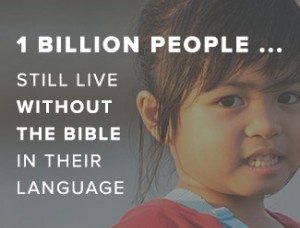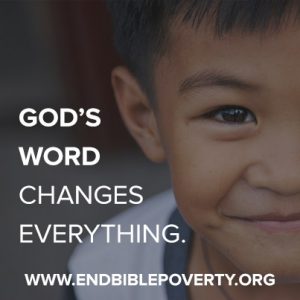
#endbiblepoverty
If you follow me on Twitter, you’ve seen this message now and then, but do you know what it means?
While at Allume 2012, I spoke with a couple of people from The Seed Company. I signed up for their newsletter, agreed to pray for a people group, and came home to show everything to my family.
But this year, we did something different. A special meet-up was planned for the bloggers who supported TSC, and it was wonderful to chat more intimately with the other writers and members of TSC‘s staff.
During the conversation, one of the staff members asked each of us why. Why did we care about Bible translation and supporting the efforts of TSC?
Everyone around me presented an excellent answer. Being a bit on the introverted side, I sat back in my chair, a little embarrassed by mine, as it didn’t seem as eloquent as the others.
I grew up aware of missions, but I didn’t fully grasp an appreciation for it until I met my British husband. An American missionary led my husband to the Lord, which would surprise some, since England isn’t considered an unreached mission field.
After we were married and seeing how God was using him here in the US, I had a new perspective on the importance of missions.
How did marrying an Englishman give me a heart for Bible translation? After all, he most certainly has a Bible in his own language.
As I started to research curriculum, I knew I wanted something more than typical academics. Because of my husband’s own strong views on missions, one company stood out and intrigued me–My Father’s World. Even though we’ve used MFW throughout the years and have taken a break from it now and then, it was because of MFW, specifically the Exploring Countries and Cultures year, that we learned about the many people groups across the world that don’t have a Bible in their language.
Every time my children and I read from our copy of Window on the World, we prayed for the different families and children who never heard of Noah and the Ark, Adam and Even, or any of the other stories that we took for granted.
In the US, we’re able to buy a complete Bible any day of the week. I think our own family has at least five or more copies. They’re not difficult to find. We were brought to our senses to learn that some people may only have a few pages or a couple of chapters in their own language. Missionary friends describe the need in their area, explaining how they’ve seen several people standing or sitting together, trying to read the same page because it’s the only page they have.
Yes, even though I didn’t fully grasp the need for Bible translation until a couple of years ago, the seed was planted back in 1998, when I met an Englishman coming to the US to attend Bible college.
Neat how things work.
To learn more about how you can get involved, visit TSC’s about page, find a project, and join other families across the world as they pray to end Bible poverty.

Free Guide For the Natural Living Mom

Want to know how to use essential oils and herbs in your home? In this guide, I share my top 10 favorites.
Plus get our latest content and news, including giveaways and freebies for the natural living and homeschooling mom.



As a field missionary, I can’t tell you how important it is to have the Bible accessible to those we’re trying to reach. Honestly, it’s one of the reasons that we focus on training Nepali believers as church planters– there is much more power in knowing that God has met you right where you are, that He speaks your language, and that He knows you personally than in seeing an outsider trying to fill that role. Thank you for being a voice for this outreach!
Heather, thank you so much for visiting and for sharing your experience! Have a blessed day!